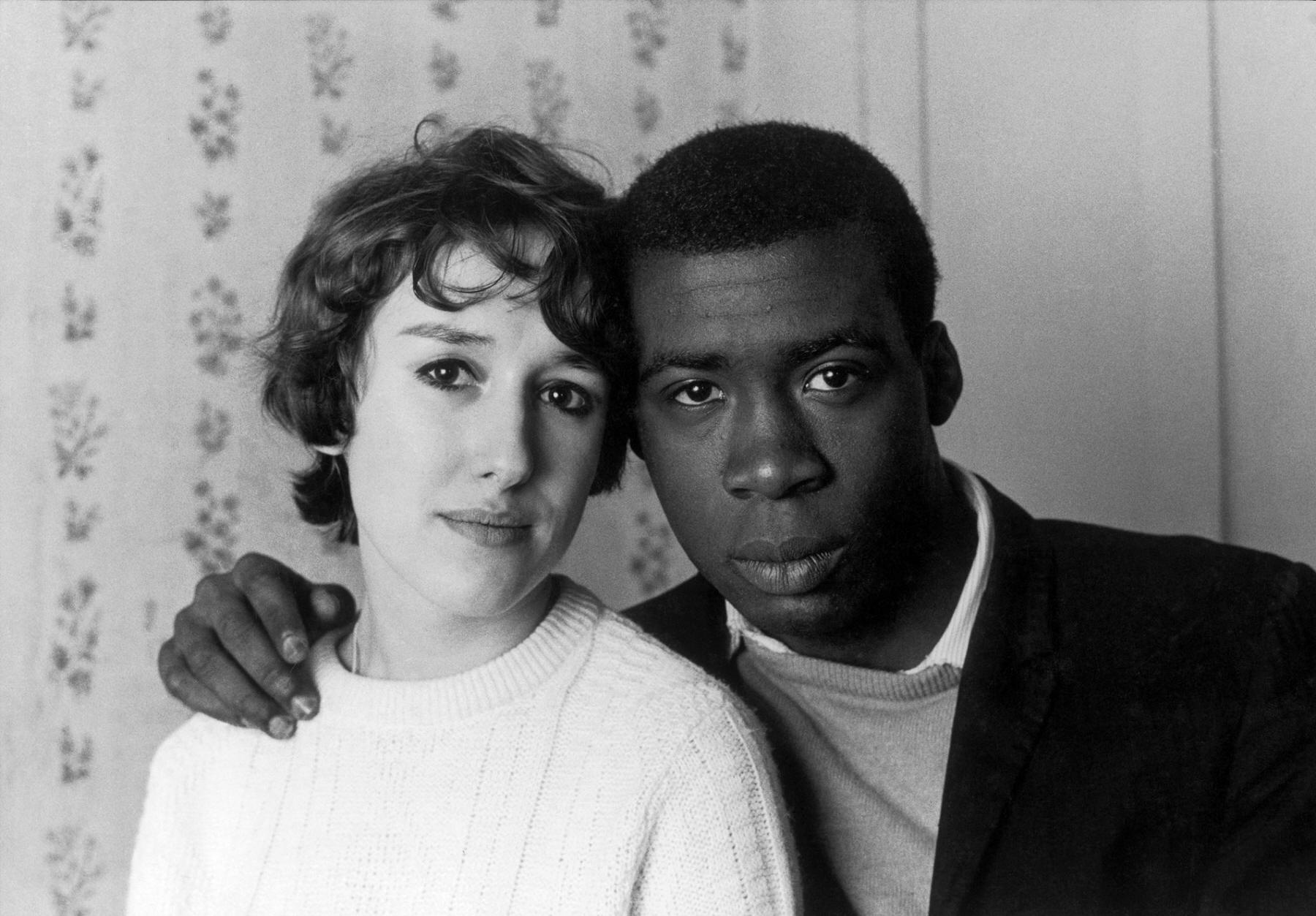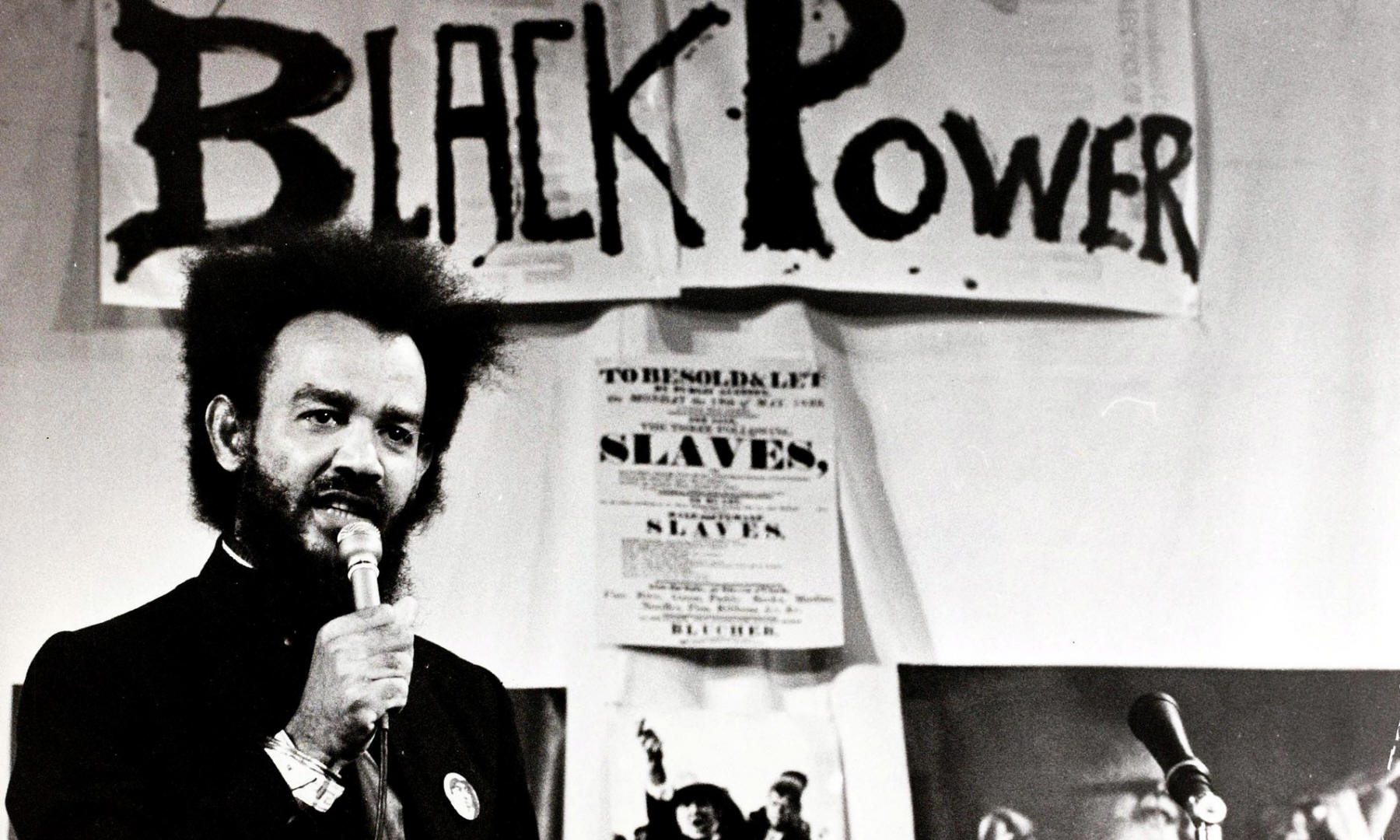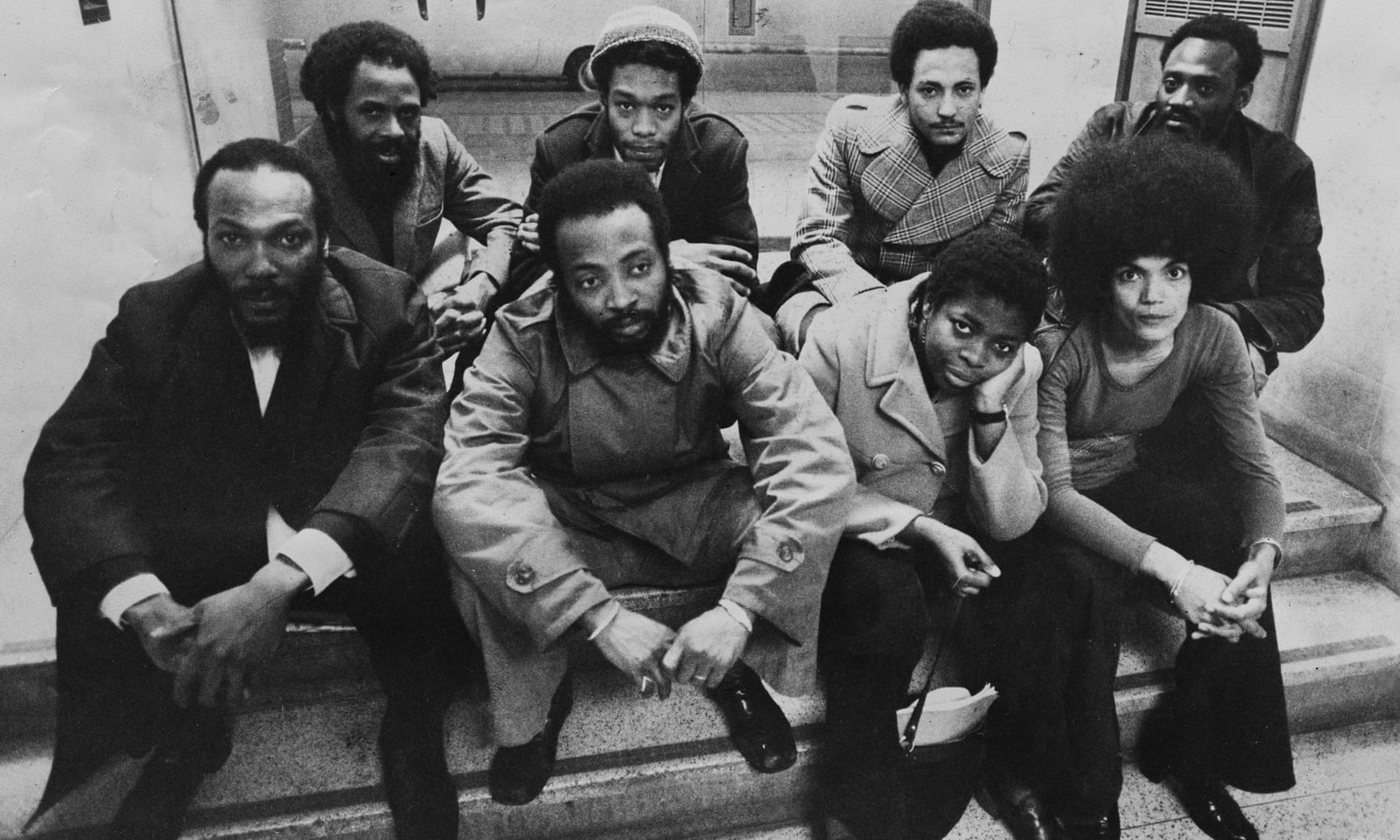|
Vocapedia >
Race relations
> UK > Blackness

Notting Hill Couple, London (1967)
Phillips’s image,
taken when mix-raced relationships
were
still relatively taboo,
ended up on the cover of London Is The Place for Me,
a
compilation of British calypso
Photograph:
Charlie Phillips (Born 1944)
Image Courtesy of Beetles+Huxley
Punks, prams and carparks:
British national
identity – in pictures
G
Monday 1 August 2016 07.00 BST
https://www.theguardian.com/artanddesign/gallery/2016/aug/01/
an-ideal-for-living-photography-exhibition-britain-class
coon, wog, nigger (racist)
http://www.guardian.co.uk/stage/2009/feb/06/
lenny-henry-career-family-othello
Sooty (racist)
http://www.guardian.co.uk/uk/2009/jan/12/
prince-harry-racism
'the wrong colour'
http://www.guardian.co.uk/uk/the-northerner/2013/feb/11/
bradford-race-issues-school

African Liberation Day march through Handsworth in 1977.
The children of the Windrush generation were growing up,”
said
Burke,
“and their eyes were opening to a wider political agenda.
Everyone I knew was involved with the movement in some way.”
Photograph: Vanley Burke
Fightback: Vanley Burke's black Birmingham – in pictures
The Jamaica-born ‘godfather of black British photography’
spent the 70s and 80s documenting street protests in the city.
His work can be seen at Cardiff’s Diffusion festival until 31
May
G
Thursday 25 May
2017 07.00 BST
https://www.theguardian.com/artanddesign/gallery/2017/may/25/
vanley-burke-birmingham-godfather-black-british-photography-jamaican-cardiff-diffusion-festival-#img-5

Untitled, from the series The Black House,
1973-1976
Photograph: Colin Jones
Courtesy Autograph
Beauty contests and Brixton fashion:
black Britain in the 1970s – in pictures
From the archive of arts agency Autograph,
these photos depict the lives of black Britons,
from sound systems to strident politics
G
Tue 21 Aug 2018 07.00 BST
https://www.theguardian.com/artanddesign/gallery/2018/aug/21/
black-britain-in-the-1970s-autograph-in-pictures

Black Power leader Michael X
speaking at a rally in London in
1972.
Photograph: Popperfoto/Getty Images
The story of the British Black Panthers
through race,
politics, love and power
O
Sunday 9 April
2017 07.00 BST
https://www.theguardian.com/world/2017/apr/09/
british-black-panthers-drama-photography-exhibition
UK > black
FR / UK / USA
https://www.theguardian.com/books/2024/sep/24/
a-woman-like-me-a-memoir-by-diane-abbott-review-
rich-and-complex-record-of-resilience
https://www.mediapart.fr/journal/culture-et-idees/220824/
la-presence-de-personnes-noires-en-angleterre-une-histoire-ancienne
https://www.theguardian.com/artanddesign/gallery/2024/jun/07/
notting-hill-in-the-60s-and-70s-
black-britain-through-the-lens-of-charlie-phillips-in-pictures
https://www.theguardian.com/news/audio/2024/mar/08/
good-times-and-dances-might-last-for-ever-the-sound-of-londons-black-gay-scene-
podcast - Guardian podcast
https://www.nytimes.com/2022/09/07/
books/review/in-search-of-mary-seacole-helen-rappaport.html
https://www.theguardian.com/commentisfree/2021/oct/31/
black-british-1800s-before-windrush
https://www.theguardian.com/news/audio/2020/jul/31/
young-british-and-black-a-generation-rises-
podcast
https://www.theguardian.com/world/2017/oct/03/
housing-crisis-why-worse-for-black-families-social-housing
https://www.theguardian.com/uk-news/2017/aug/01/
met-police-using-force-against-disproportionately-large-number-of-black-people
https://www.theguardian.com/artanddesign/2012/mar/25/
dennis-morris-growing-up-black-photography
black people
https://www.theguardian.com/uk-news/gallery/2021/jul/30/
a-portrait-of-black-lives-in-suffolk-in-pictures
https://www.theguardian.com/uk-news/2017/aug/01/
met-police-using-force-against-disproportionately-large-number-of-black-people
black lives
https://www.theguardian.com/uk-news/gallery/2021/jul/30/
a-portrait-of-black-lives-in-suffolk-in-pictures
black fatherhood
https://www.theguardian.com/artanddesign/2021/jul/29/
fathers-and-figures-renee-osubu-black-fatherhood

Mary Seacole’s work on the Crimean front
made her a legend in
her own time.
Credit: Pictorial Press Ltd / Alamy Stock Photo
Florence Nightingale’s Rival Gets the Last Laugh
Helen Rappaport’s “In Search of Mary Seacole”
gives a Black
nursing legend her due.
NYT
September 7, 2022
https://www.nytimes.com/2022/09/07/
books/review/in-search-of-mary-seacole-helen-rappaport.html
19th centruy > Jamaica, UK > Black nursing
legend
Mary Jane Seacole (née Grant) 1805-1881
UK / USA
https://www.nytimes.com/2022/09/07/
books/review/in-search-of-mary-seacole-helen-rappaport.html
https://www.theguardian.com/books/2017/apr/10/
100-best-nonfiction-books-wonderful-adventures-of-mrs-seacole
https://www.theguardian.com/gnmeducationcentre/2016/oct/05/
mary-seacole-memoirs-archive-teaching-resource
https://www.theguardian.com/commentisfree/2016/jun/21/
rubbishing-mary-seacole-hide-black-contributions-britain
https://www.theguardian.com/artanddesign/shortcuts/2016/jun/20/
mary-seacole-florence-nightingale-statue-st-thomas-hospital-row
https://www.theguardian.com/society/2014/oct/27/
mary-seacole-was-kind-and-generous-but-no-pioneer-nurse
https://www.theguardian.com/education/2013/jan/06/
gove-mary-seacole-black-florence-nightingale
https://www.theguardian.com/theguardian/2005/jan/15/
guardianletters
blackness
https://www.theguardian.com/education/2018/jul/07/
how-survive-as-black-man-at-oxford-university-michael-donkor
https://www.theguardian.com/uk-news/2018/may/19/
meghan-markles-wedding-was-a-celebration-of-blackness
UK's first black archbishop
2005
http://www.theguardian.com/world/2005/nov/30/
religion.uk
Black Britons
https://www.theguardian.com/world/2021/jan/17/
forty-years-on-from-the-new-cross-fire-what-has-changed-for-black-britons
black Britain in the 1970s
https://www.theguardian.com/artanddesign/gallery/2024/jun/07/
notting-hill-in-the-60s-and-70s-
black-britain-through-the-lens-of-charlie-phillips-in-pictures
https://www.theguardian.com/artanddesign/gallery/2018/aug/21/
black-britain-in-the-1970s-autograph-in-pictures
Notting Hill in the 60s and 70s:
Black Britain through the lens of
Charlie Phillips – in pictures
https://www.theguardian.com/artanddesign/gallery/2024/jun/07/
notting-hill-in-the-60s-and-70s-
black-britain-through-the-lens-of-charlie-phillips-in-pictures
Celebrating Black NHS nurses through the decade
–
in pictures
The NHS is one of only two things
that hold Britain
together as a community.
The second being the BBC.
During Covid-19
these two national treasures
have become our guiding
strength.
Black people have been
an integral part of the NHS
since the 40s.
I am very proud to say
my mother worked for the NHS
for more than 35 years before she retired.
These institutions are worth fighting for.
https://www.theguardian.com/artanddesign/gallery/2020/nov/15/
celebrating-black-nhs-nurses-through-the-decades-in-pictures
west London cafe > the Mangrove, Notting Hil
a symbol of black urban resistance
The Mangrove
was established in 1968 by Frank Crichlow,
an entrepreneur from Trinidad
who became a community activist
and symbol of black urban resistance
in the face of police persecution.
https://www.theguardian.com/uk-news/2018/sep/15/
remembering-the-mangrove-notting-hill-caribbean-haven
Black England
https://www.theguardian.com/books/2022/sep/24/
zadie-smith-in-praise-of-black-england-gretchen-gerzina
Gretchen Gerzina’s 1995 book Black England
https://www.theguardian.com/books/2022/sep/24/
zadie-smith-in-praise-of-black-england-gretchen-gerzina
Black English
http://www.bbc.co.uk/radio4/
routesofenglish/storysofar/programme3_4.shtml
The Voice
https://www.voice-online.co.uk/
black feminist politics
https://www.theguardian.com/lifeandstyle/2018/feb/01/
women-1980s-diane-abbott-black-women-radical-feminism
Britain's black power movement / British black
power
https://www.theguardian.com/world/2021/mar/25/
british-black-power-stars-of-bbc-documentary-reflect-on-uk-activism
https://www.theguardian.com/world/2017/apr/09/
british-black-panthers-drama-photography-exhibition
http://www.theguardian.com/world/2013/dec/27/
britain-black-power-movement-risk-forgotten-historians
Britain's black power movement
Darcus Howe
one of the most significant black activists in
Britain
https://www.theguardian.com/profile/
darcus-howe
http://www.theguardian.com/world/2013/dec/27/
britain-black-power-movement-risk-forgotten-historians

Eight members of the Mangrove Nine,
who were wrongfully accused of incitement to riot.
Photograph: Evening Standard/Getty Images
Our first political prisoner?
No. Locking up dissenters is an ignoble British tradition
G
Sun 27 Oct 2024 08.00 CET
Last modified on Sun 27 Oct 2024 08.09 CET
https://www.theguardian.com/commentisfree/2024/oct/27/
two-tier-justice-britain-political-policing
Britain's black power movement
Mangrove Nine:
the court challenge against police racism in
Notting Hill
https://www.theguardian.com/law/2010/nov/29/
mangrove-nine-40th-anniversary
In 1970,
a group of black radicals were committed to stand trial
on charges arising from violent clashes
between the police during a protest march.
From the outset,
this was a political trial in which the police,
Special Branch and the Home Office
sought to discredit the leadership
of the growing British black power movement.
After 55 days at the Old Bailey,
the Mangrove Nine were acquitted
and forced the first judicial acknowledgment
that there was "evidence of racial hatred"
in the Metropolitan police.
The nine's campaign was part of a campaign
to defend Notting Hill's black community
from police racism.
At the end of the 1960s,
Frank Crichlow's Mangrove restaurant
became the beating heart of the area's
West Indian community.
At the same time, "the heavy mob",
a group of officers who patrolled the community
like a colonial army,
began a campaign to close the Mangrove,
raiding the restaurant 12 times
between January 1969 and July 1970.
The police stuck to the story
that the Mangrove was a drugs den,
despite the fact that their repeated raids
yielded not a shred of evidence.
https://www.theguardian.com/law/2010/nov/29/
mangrove-nine-40th-anniversary
https://www.theguardian.com/commentisfree/2024/oct/27/
two-tier-justice-britain-political-policing
https://www.theguardian.com/law/2010/nov/29/
mangrove-nine-40th-anniversary
Black Power activist Michael X
https://www.theguardian.com/commentisfree/2024/oct/27/
two-tier-justice-britain-political-policing
British Black Panthers
https://www.theguardian.com/world/2017/apr/09/
british-black-panthers-drama-photography-exhibition
John La Rose 1927-2006
intellectual, trades unionist, campaigner, poet
https://www.theguardian.com/news/2006/mar/04/
guardianobituaries.socialexclusion
black Britain
https://www.theguardian.com/artanddesign/2018/aug/07/
they-wanted-to-jail-us-all-
black-panthers-photographer-neil-kenlock-looks-back
https://www.theguardian.com/politics/2008/feb/24/
race
black British identity
https://www.theguardian.com/artanddesign/gallery/2017/may/05/
eddie-chambers-black-british-identity-in-pictures
black British films
https://www.theguardian.com/film/2022/jun/21/
banned-knighted-horace-ove-godfather-
black-british-film-making-pressure-police-brutality-reggae
https://www.theguardian.com/film/2020/jun/19/
from-pressure-to-the-last-tree-10-of-the-best-black-british-films
black
British film-making > Horace Ové
https://www.theguardian.com/film/2022/jun/21/
banned-knighted-horace-ove-godfather-
black-british-film-making-pressure-police-brutality-reggae
Britain’s rich history of black literature
https://www.theguardian.com/news/audio/2021/dec/27/
revisited-britains-rich-history-of-black-literature-podcast
https://www.theguardian.com/news/audio/2021/oct/18/
britains-rich-history-of-black-literature-podcast
Fightback: Vanley Burke's black Birmingham – in pictures
The Jamaica-born
‘godfather of black British photography’
spent the 70s and 80s
documenting street protests in the city.
https://www.theguardian.com/artanddesign/gallery/2017/may/25/
vanley-burke-birmingham-godfather-black-british-photography-
jamaican-cardiff-diffusion-festival-
timeline
> Black history
https://www.theguardian.com/world/ng-interactive/2020/jul/11/
black-history-timeline
Black History Month
https://www.theguardian.com/uk/
blackhistorymonth
https://www.theguardian.com/world/2017/oct/01/
barnardos-black-history-victorian-archive-children-photos-testimonials
https://www.theguardian.com/commentisfree/cifamerica/2012/feb/01/
black-history-month-whitewashing
https://www.theguardian.com/commentisfree/2008/oct/11/
blackhistorymonth-race1
Black Lives Matter
https://www.theguardian.com/uk-news/gallery/2016/aug/05/
black-lives-matter-uk-rally-in-three-cities-in-pictures
Black Lives Matter,
racism in football
and representation in sports media
https://www.theguardian.com/football/audio/2020/jun/10/
black-lives-matter-racism-in-football-and-representation-
in-sports-media-football-weekly-special
Corpus of news articles
UK > Black power, BLM,
Blackness, Black
British identity
Racism Charges
Put a Sport on
Edge
December 21, 2011
The New York Times
By JERÉ LONGMAN
John Terry, captain of
England’s national soccer team and the powerful club Chelsea, faces a criminal
charge over accusations that he made a racial slur during an October match,
apparently becoming the first player to be prosecuted for remarks said on the
field.
The accusation against Terry, which he denied, represents an escalation in the
attempt to stem the persistent and widespread problem of racism in European
soccer.
On Tuesday, the Uruguayan forward Luis Suárez, who plays for Liverpool of the
English Premier League, was suspended for eight matches and fined about $63,000
for making abusive remarks in an October game toward Patrice Evra, a black
defender from France who plays for Manchester United.
On Wednesday, the Crown Prosecution Service, the agency responsible for laying
criminal charges, said it had charged Terry.
Antiracism officials said they were encouraged by the actions taken against
Terry and Suárez. But they cautioned that international soccer had lately sent
mixed messages about discrimination despite a campaign over the past five years
to reduce racial smears made on the field and in the stands. Fans in some
European countries have been known to throw bananas and peanuts, and direct
monkey chants, toward black players.
Sepp Blatter, the embattled president of FIFA, soccer’s world governing body,
was widely criticized last month after trying to minimize the extent of racism
on the field and suggesting that any player who felt affronted should settle the
matter with a postgame handshake.
The Terry and Suárez cases represent “a very important step that sends two
messages,” said Lord Herman Ouseley, chairman of the London-based
antidiscrimination organization called Kick It Out. “If you are inclined to
behave like that, you are not going to get away with it,” he said. “And it’s
encouraging to black players, who have often felt, ‘Why bother, it’s a waste of
time.’ Most thought nothing would come out of these allegations.”
At the same time, Ouseley said in a telephone interview that he would withhold
judgment on English soccer’s long-term determination to stamp out racism until
Terry’s case played out through the judiciary and Suárez decided whether to
appeal his ban by England’s soccer federation, known as the Football
Association. He has 14 days to file an appeal.
“We will have to wait and see whether there is consistency and durability in
application of a high standard of conduct, backed by strong investigation and
discipline with penalties, or whether this is a one-off, and we go back to
leniency and complacency,” Ouseley said.
The English Premier League is considered the world’s best club competition and
features many of the top international players. Two-thirds are foreign-born.
Racial sensitivity in the league has increased substantially in recent years,
and the atmosphere is considered far more embracing than leagues in Spain and
Italy. Yet, the Terry and Suárez cases indicate that English officials are still
troubled by some abusive on-the-field behavior.
Terry, who is 31, appears to be the first player to face a criminal charge of
racism, said Ouseley and Howard Holmes, founder of another London-based
antidiscrimination group called Football Unites, Racism Divides.
“I can’t find any other case where the police were involved,” Holmes said in a
telephone interview. “There have been a number of instances that have gone to
court, but they’ve been fan-based.”
Terry, who is white, is accused of making a racist remark during an October
match toward Anton Ferdinand, a black defender who plays for Queens Park
Rangers, a London rival of Chelsea.
A hearing for Terry is scheduled for Feb. 1. He is charged with violating
Britain’s Crime and Disorder Act (of) 1998, which focuses on antisocial
behavior. If found guilty, the maximum fine he faces is about $4,000, but a
conviction could cost Terry the captaincy of his club and national team, his
reputation and his ability to earn endorsement money.
“I am satisfied there is sufficient evidence for a realistic prospect of
conviction and it is in the public interest to prosecute this case,” Alison
Saunders, London’s chief crown prosecutor, said in a statement.
Terry has denied the charge, saying the context of his remarks was
misunderstood. He said in a statement Wednesday, “I have never aimed a racist
remark at anyone and count people from all races and creeds among my closest
friends.”
According to The Guardian newspaper of London, Ferdinand did not immediately
realize what Terry had said to him during the October match. Rather, Ferdinand
grew concerned later when the encounter between the two players drew widespread
attention on social media sites. He later saw footage of the confrontation that
had been posted on the Internet.
Terry has said that he thought Ferdinand was accusing him of making a racial
slur during their encounter and responded to Ferdinand by saying he would never
use such a term.
The situation is complicated because Ferdinand’s brother, Rio, is a partner of
Terry’s in central defense for England’s national team. And it was Rio Ferdinand
who scathingly challenged Blatter’s suggestions last month that players should
resolve racial tensions with handshakes. Via Twitter, Rio Ferdinand, who plays
with Evra for Manchester United, called Blatter’s remarks “condescending” and
“almost laughable.”
Blatter was widely ridiculed and Hugh Robertson, the British sports minister,
urged him to resign. Blatter declined to step down but said he regretted his
remarks and promised “zero tolerance” of racist behavior in soccer. A FIFA
campaign against racism began at the 2006 World Cup in Germany.
The widespread reaction against Blatter’s remarks in England, as well as the
social media response to the Terry incident, undoubtedly influenced the Suárez
suspension and the decision to prosecute Terry, said Holmes, the
antidiscrimination official.
“We can’t adopt a holier-than-thou attitude and, when it’s in our backyard, wash
our hands of it,” Holmes said.
Suárez, the Liverpool forward, was accused of using a racial term 10 times
against Evra in an October match against Manchester United. Suárez has said that
he did not realize that language that was acceptable in his native Uruguay was
considered racist in England.
“I understand the point about cultural differences,” Gordon Taylor, chief
executive of the union for England’s professional soccer players, told British
reporters Wednesday. “But if you come to this country, all players have to abide
by not just the laws of the game, but the laws of the land as well.”
Liverpool has vigorously defended Suárez. During warm-ups for their match
against Wigan on Wednesday, his teammates wore white T-shirts with an image of
Suárez on the front and his name and his number, 7, on the back.
Rob Hughes contributed
reporting from London.
Racism Charges Put a Sport on Edge,
NYT,
21.12.2011,
https://www.nytimes.com/2011/12/22/
sports/soccer/in-england-star-players-accused-of-racist-comments.html
April 22, 1968
Enoch Powell
dismissed
for 'racialist' speech
From the Guardian archive
Monday April 22, 1968
Guardian
Ian Aitken
Mr Heath last night dismissed Mr Enoch Powell
from the Shadow Cabinet. It became clear that the members of Mr Heath's Shadow
Cabinet were unanimous that Mr Powell would have to go. Several Front Bench
members let it be known that they would resign if Mr Powell remained. Two of the
leading figures in the drama appear to have been Mr Maudling, deputy leader of
the party, and Mr Hogg, chief home affairs spokesman. Both are understood to
have been appalled by Mr Powell's inflammatory speech.
Certainly there were intensive consultations
between members of the Shadow Cabinet and between many of them and Mr Heath. By
the end of the afternoon it must have been apparent that Mr Heath would receive
the full support of his colleagues if he dismissed Mr Powell. It was emphasised,
however, that the decision to dismiss Mr Powell belonged to Mr Heath personally.
He appears to have spent most of the day at Broadstairs brooding on the
situation created by Mr Powell's highly emotive speech on the Race elations
Bill, and to have telephoned Mr Powell at Wolverhampton at about 9pm.
A statement issued by Mr Heath said: "I have told Mr Powell that I consider the
speech he made in Birmingham yesterday to have been racialist in tone and liable
to exacerbate racial tensions. This is unacceptable from one of the leaders of
the Conservative Party."
Friends of Mr Heath insisted that this was a decision which could not be delayed
once it had been reached. The sense of relief expressed by several of My Heath's
colleagues late last night underlined this point.
But there is no doubt that a major factor in making up Mr Heath's mind was the
certainty of a further 24 hours of unfavourable press comment - even from
normally Conservative newspapers.
Mr Powell is certain to receive the impassioned support of Right-wing Tories for
his expression of views on the race question which are widely popular among
sections of the electorate. As one Tory MP put it last night, with an eye to
public opinion: "You could call him Mr National Opinion Powell."
[Powell said Commonwealth immigration policy must be "mad, literally mad",
adding: "It is like watching a nation busily engaged in heaping up its own
funeral pyre" and "Like the Roman, I seem to see the River Tiber foaming with
much blood."]
From the Guardian archive,
Enoch Powell dismissed for 'racialist' speech,
April 22,
1968,
G,
Republished 22.4.2006,
https://www.theguardian.com/news/1968/apr/22/
mainsection.ianaitken
Explore more on these topics
Anglonautes > Vocapedia
UK > race
relations >
Black people, white people
economy > slavery > 21st century
slavery,
eugenics,
race relations,
racial divide, racism,
segregation, civil rights,
apartheid
immigration > UK
Related > Anglonautes >
History
British Empire > Slavery
British
Empire, England >
19th-17th century
|